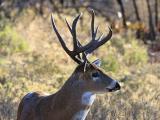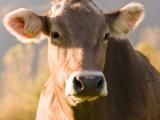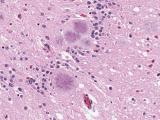Apr 17, 2006 (CIDRAP News) A 6-year-old dairy cow in British Columbia, Canada, has been confirmed as that country's 5th case of bovine spongiform encephalopathy (BSE).
Testing conducted at the National Centre for Foreign Animal Diseases in Winnipeg, Canada, showed the cow had BSE, the Canadian Food Inspection Agency (CFIA) announced yesterday. No part of the animal has entered the human food or animal feed chain, Canadian authorities said.
The CFIA is investigating how the cow became infected, with special attention to feed practices early in the cow's life. The cow was from a farm in Fraser Valley. She was identified through Canada's nationwide BSE surveillance efforts.
Because of government safeguards, the case does not affect the safety of Canadian beef, another CIDRAP story cited the CFIA as saying last week. Tissues where BSE is known to concentrate in infected animals are removed from all cattle slaughtered in Canada. In addition, cattle at increased risk are tested, and the use of cattle protein in cattle feed is banned.
Four BSE cases have been found in Canada, the first one in May 2003, CIDRAP has reported previously. The last confirmed case was identified in Jan 2006 in a 6-year-old cow in northern Alberta. The first case led to a 2-year ban on shipments of live Canadian cattle into the United States. The US border was reopened in July 2005 to Canadian cattle younger than 30 months old.
See also
Apr 14 CIDRAP News story
http://www.cidrap.umn.edu/cidrap/content/other/bse/news/april1406bse.html



















